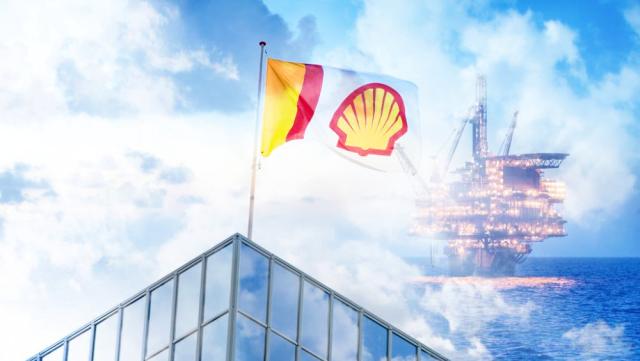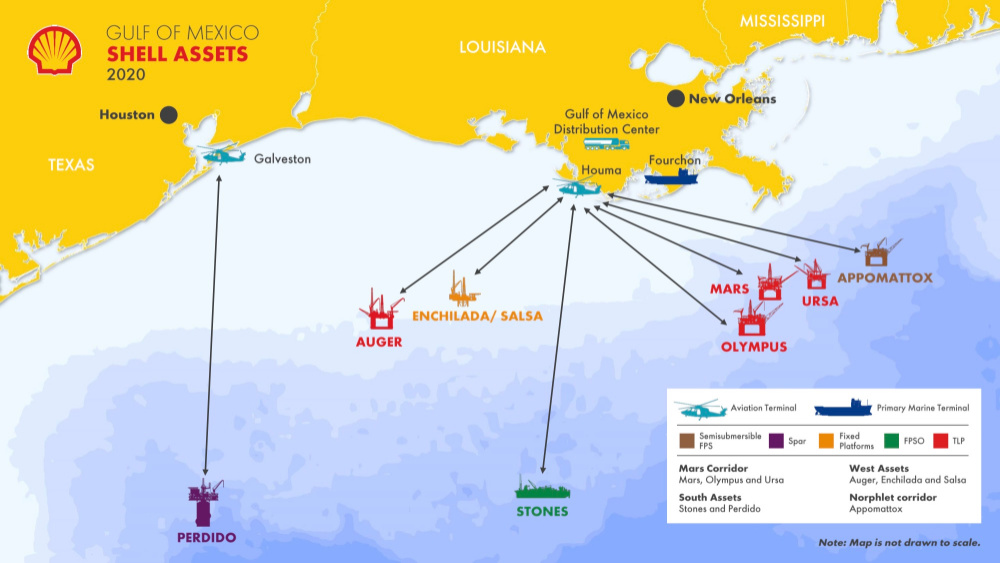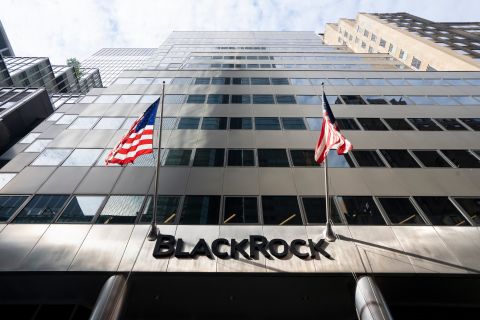
Shell said production from Whale will be among the lowest greenhouse-gas intensity in the world for producing oil. (Source: Collage by Hart Energy; images from Royal Dutch Shell Plc)
Royal Dutch Shell Plc unveiled plans on July 26 to develop a new deepwater project in the U.S. Gulf of Mexico expected to reach peak production of around 100,000 boe/d.
The development, named Whale, is owned and operated by Shell in the Gulf of Mexico’s Alaminos Canyon Block 773. Whale marks the first major oil and gas project announced by Shell since a Dutch court in May ordered the Anglo-Dutch company to accelerate its carbon emissions reduction targets.
In a release on July 26 announcing the project’s final investment decision (FID), Shell said production from Whale will be among the lowest greenhouse-gas (GHG) intensity in the world for producing oil. Further, the company plans to use a similar platform to an existing nearby Shell-operated field, Vito, expected to result in an internal rate of return estimated of greater than 25%.
“Whale is the latest demonstration of our focus on simplification, replication and capital projects with shorter cycle times to drive greater value from our advantaged positions,” commented Wael Sawan, Shell upstream director, in the release.
Discovered in 2017, Whale currently has an estimated, recoverable resource volume of 490 million boe. Shell and partner, Chevron Corp., expect Whale to begin production in 2024.
Whale, Shell’s 12th deepwater project in the Gulf of Mexico, will be only the second Shell-operated deepwater development in the region to employ the “simplified, cost-efficient host design” currently being used at Vito, which is scheduled to begin production in 2022.
“We are building on more than 40 years of deepwater expertise to deliver competitive projects that yield high-margin barrels so that we are able to meet the energy demands of today while generating the cash required to help fund the development of the energy of the future,” Sawan added in the release.

Whale’s design will closely replicate Vito, a four-column semisubmersible host facility located in the greater Mars Corridor. Whale will also feature energy-efficient gas turbines and compression systems comprising a 99% replicated hull and an 80% replication of the topsides from the Vito project.
By leveraging the engineering, construction and supply chain of Vito, Shell said Whale is expected to achieve first oil 7.5 years after discovery. The cycle time includes the impact from COVID cash-preservation efforts that delayed project FID by one year, according to the Shell release.
Shell owns and operates Whale with a 60% interest in the development. Partner, Chevron U.S.A. Inc., holds the remaining 40% interest.
Despite already setting one of the sector’s most ambitious climate strategies earlier this year, Shell was ordered in May by a district court in The Hague to reduce its CO₂ emissions by 45% from 2019 levels by 2030. The move was considered a landmark ruling as it could trigger further legal action on climate issues against energy companies around the world.
On July 20, Shell confirmed it would appeal the ruling though CEO Ben van Beurden said the company will still seek to ramp up its energy transition strategy.
“We agree urgent action is needed and we will accelerate our transition to net zero,” Beurden said in a statement on July 20.
“But we will appeal because a court judgment, against a single company, is not effective,” he continued. “What is needed are clear, ambitious policies that will drive fundamental change across the whole energy system.”
Shell considers its U.S. Gulf of Mexico production to be among the lowest GHG intensity in the world in comparison to other International Association of Oil & Gas Producers oil- and gas-producing members, a coalition of E&P companies focusing on the promotion of safe, responsible and sustainable operations on behalf of the world’s upstream industry.
Recommended Reading
Darbonne: The ESG Sword: BlackRock's Life, Death by ESG
2024-04-17 - BlackRock, the $10 trillion investment manager, is getting heat for too much ESG investing, while shareholders are complaining it’s doing too little.
Fire Closes Atlas Energy’s Kermit, Texas Mining Facility
2024-04-15 - Atlas Energy Solutions said no injuries were reported and the closing of the mine would not affect services to the company’s Permian Basin customers.
Coalition Launches Decarbonization Program in Major US Cities, Counties
2024-04-11 - A national coalition will start decarbonization efforts in nine U.S. cities and counties following a federal award of $20 billion “green bank” grants.
Exclusive: Scepter CEO: Methane Emissions Detection Saves on Cost
2024-04-08 - Methane emissions detection saves on cost and "can pay for itself," Scepter CEO Phillip Father says in this Hart Energy exclusive interview.




